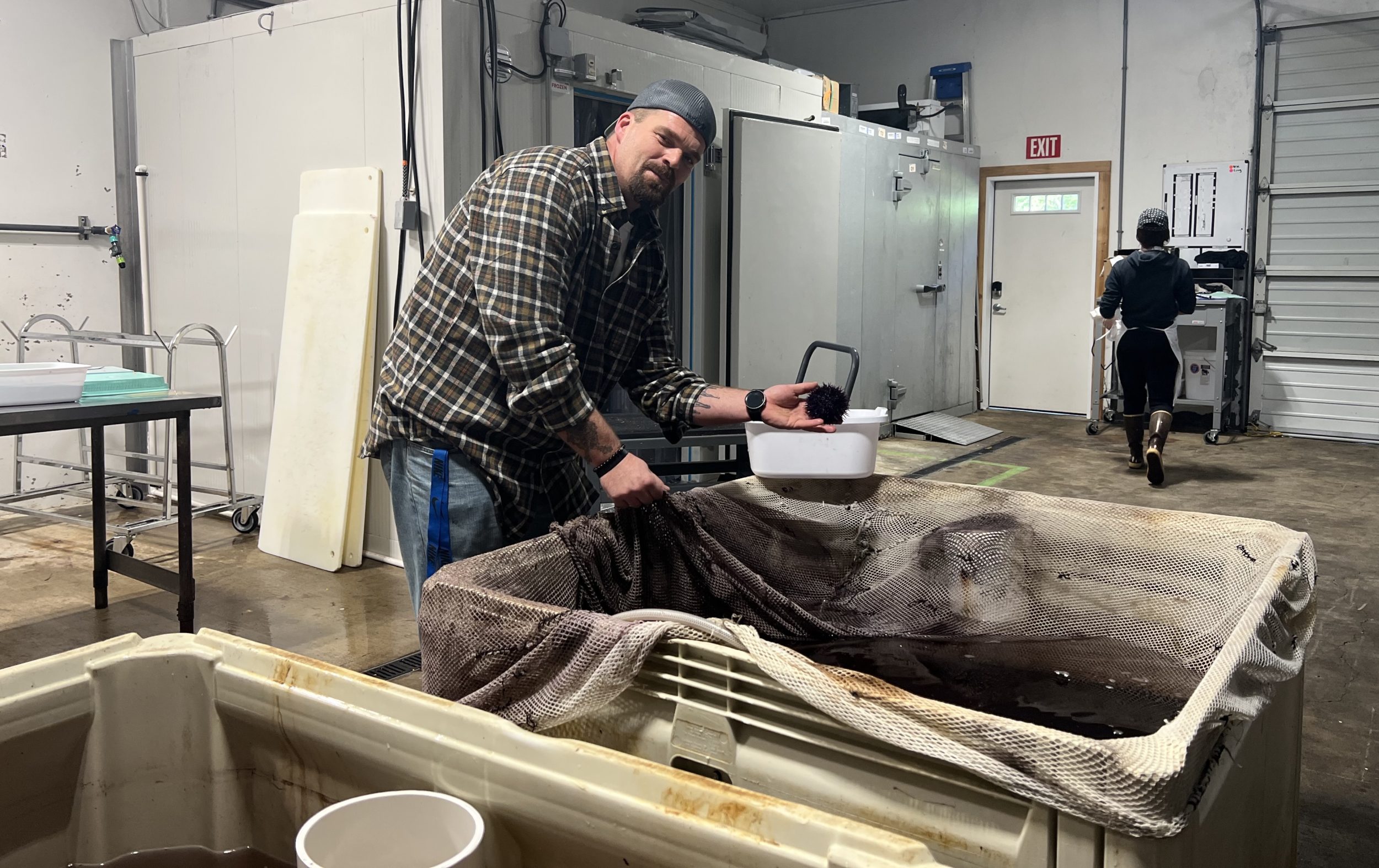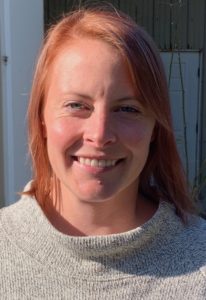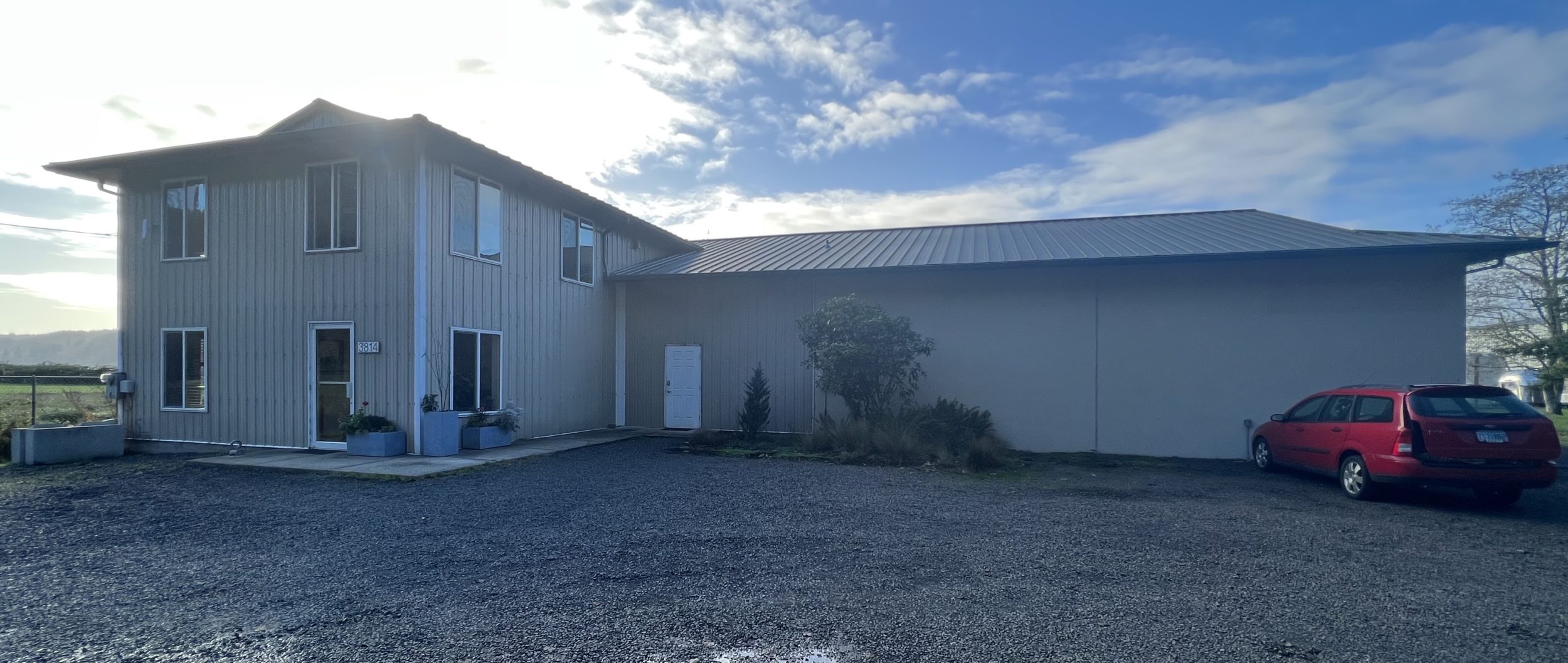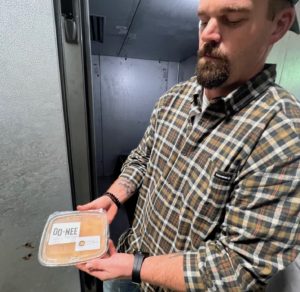
BY GARRET JAROS/YachatsNews
NEWPORT – Tucked in a nondescript building on the shore of Yaquina Bay is a new hub of innovation intent on transforming the local seafood market.
Central Coast Food Web and its Yaquina Lab is a non-profit founded specifically to help local fisheries and other food producers on the central coast bring their products to local markets and to develop regional supply chains for sustainable seafood in Oregon. It is the first of its kind in Lincoln County.
This week, Sens. Ron Wyden and Jeff Merkeley and Rep. Val Hoyle, D-Ore. announced the food web had received a $477,774 grant from the U.S. Department of Agriculture to promote local and regional food systems.

“We are really trying to keep local food local,” said food web co-executive director Sara O’Neill. “Ninety-percent of the seafood in Oregon is not actually from Oregon and it’s sort of a troubling statistic that we think is important to inform people about.”
Central Coast Food Web was founded by Laura Anderson, founder of Newport’s Local Ocean Seafoods restaurant, and Kristin Penner, in partnership with the Oregon Coast Visitors Association’s ocean cluster initiative.
The visitor’s association is taking a lead role in re-localizing food systems on the Oregon coast and supporting efforts to keep more local seafood in local communities, according to the association.
“The initiative focuses on enhancing the use of local sustainable seafood in small businesses through infrastructure investments, workforce training, and partnership development,” the association’s website states.
The initiative is partnering with nearly a dozen entities, including the Central Coast Food Web, who share the vision to improve local seafood access to local markets, impacting fishermen, processors, wholesalers, retailers, and consumers.
While the Oregon coast boasts a robust fishing industry, most of the seafood sold in local restaurants and stores comes from distant domestic and international markets while much of the seafood harvested along the Oregon coast bypasses local markets.
“It is really difficult to bring fish in from our shores and sell it locally,” O’Neill said. “There are serious challenges to that. Our facility and our organization is specifically designed to help fisherman and other food producers meet those challenges.”
The Yaquina lab provides a seafood processing area complete with fileting station, dehydrator, vacuum pack sealer, a blast freezer essential for freshness and quality, dry-good storage, and soon a commercial kitchen and smoker.
Local farmers and foragers are also encouraged to use the Yaquina Lab.
“Obviously, we’re mostly landing seafood here in Lincoln County, the majority of calories we produce is seafood,” O’Neill said. “But we also have a really rich and wonderful farming community in our river valleys. And we are interested in supporting those folks too, they actually share a lot of the same challenges.”
Central Coast not only provides the facility to process food, it also helps navigate food safety and regulatory hoops and will be launching an online marketplace in mid-December to help harvesters and growers sell their products to individuals, restaurants and wholesale markets. The plan is to launch a weekly online market in spring.
While distribution is currently limited to picking up food orders at the lab, the goal and what the USDA grant will make possible is expansion.
“We would love to develop delivery routes and work with other food hubs in the state to bring local seafood to other hubs and develop a regional market,” O’Neill said.
The Yaquina Lab, which was up and running in February 2022, is already hosting harvesters and their crews. It rents its facilities for a nominal fee and products to be sold online will be on consignment.
“People are really excited about these resources, they just don’t exist in our area,” O’Neill said. “Folks who have found out about the availability of our processing (area) and market opportunities, because there is such a glaring need, the overwhelming reaction has been relief and light bulbs going off of ‘oh my gosh, I can’t even wrap my head around all the things I can do now with my business.’”

Sea urchin harvester
One business taking advantage of the Yaquina Lab is OO-NEE Sea Ranch based in Toledo. The ranch harvests sea urchins off the Oregon coast and farms them at a couple of locations, including at its Yaquina Bay estuary farm just a mile upstream from the lab. The owner of OO-NEE heard about the operation through Anderson’s Local Ocean Seafoods.

For those unfamiliar with OO-NEE or Uni, it is a delicacy made from sea urchin gonads that is popular in sushi and other restaurants around the world.
“Their mission is to source and work with sustainable local producers and our mission is in line with theirs so when they started the lab it just made sense to partner with them,” said OO-NEE founder and chief executive officer Aaron Huang.
The equipment and infrastructure that startups like OO-NEE doesn’t have to get off the ground without a huge investment “has been a godsend,” said Huang, who launched his business this summer.
“It really helped accelerate the process it takes to get to local markets with domestically produced seafood,” Huang said. “We always had in mind that we were going to partner with them as we got off the ground because processing is actually a very difficult thing to do domestically.”
The vast majority of raw seafood harvested in the U.S. is actually sent overseas, only to be sent back again for two roundtrips on either commercial or cargo airlines, which burns a ton of fuel and a ton of carbon, Huang explained.
“And it doesn’t make any sense,” he said. “I mean part of Yaquina Labs and Central Coast Food Web’s mission is to figure out domestic supply chains, including processing. And that’s definitely something that we’re huge fans of as well.”
The company currently provides Uni to businesses and communities along the Oregon coast as well as Portland and Seattle.
Grants make possible
A grant from the Oregon Coast Visitors Association helped launch the Central Coast Food Web and Yaquina Lab, as did grants from the Economic Development Alliance of Lincoln County and the Builders Initiative Foundation.
The USDA grant announced this week is to promote local and regional food systems.
“Oregon’s farmers, fishers and consumers are all better off when we invest in our local and regional food systems,” Hoyle said in announcing nearly $900,000 to Central Coast and organizations in Junction City and Portland. “We’re bringing Oregonians’ tax dollars back home to invest in projects through Central Coast Food Web in Newport to support more local consumption or Oregon’s world-class sustainable seafood … This will mean jobs and more access to high-quality local products for Oregonians.”
Friends and Family Farmers of Junction City received $264,360 and Pacific NW CSA Coalition of Portland got $124,999.
- Garret Jaros is YachatsNews’ full-time reporter and can be reached at GJaros@YachatsNews.com


